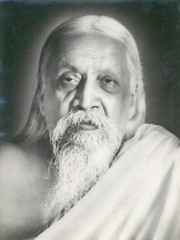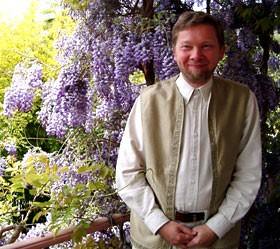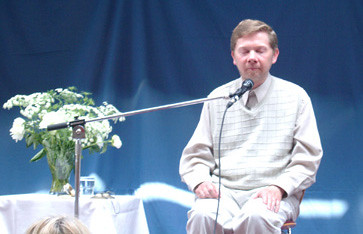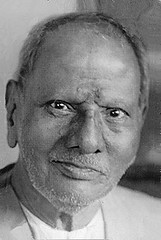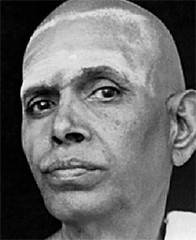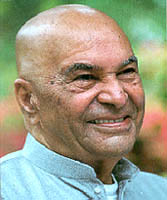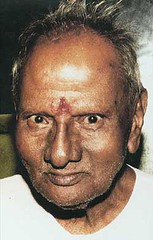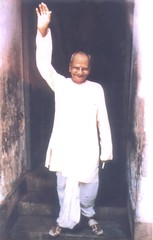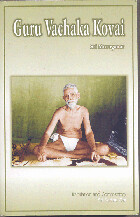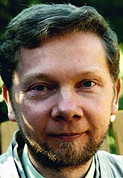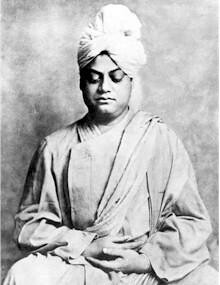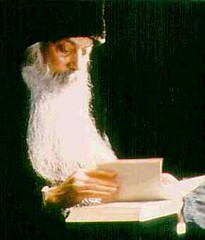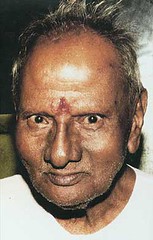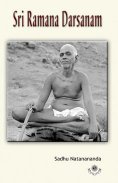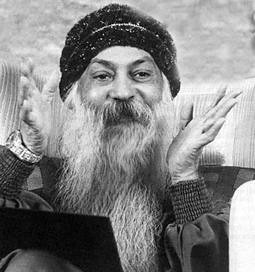Saturday, September 30, 2006
The Strength of Stillness - By Sri Aurobindo
Friday, September 29, 2006
Clock Time!
Imagine the Earth devoid of human life, inhabited only by plants and animals. Would it still have a past and a future? Could we still speak of time in any meaningful way? The question “What time is it? or “What’s the date today?” – if anybody were there to ask it – would be quite meaningless. The oak tree or the eagle would be bemused by such a question. “What time?” they would ask. “Well, of course, it is the Now. The time is Now. What else is there?”
Wednesday, September 27, 2006
"Watching The Thinker"
You have probably come across "mad" people in the street incessantly talking or muttering to themselves. Well, that's not much different from what you and all other "normal" people do, except that you don't do it out loud. The voice comments, speculates, judges, compares, complains, likes, dislikes, and so on. The voice isn't necessarily relevant to the situation you find yourself in at the time; it may be reviving the recent or distant past or rehearsing or imagining possible future situations. Here it often imagines things going wrong and negative outcomes; this is called worry. Sometimes this soundtrack is accompanied by visual images or "mental movies."
Even if the voice is relevant to the situation at hand, it will interpret it in terms of the past. This is because the voice belongs to your conditioned mind, which is the result of all your past history as well as of the collective cultural mind-set you inherited. So you see and judge the present through the eyes of the past and get a totally distorted view of it. It is not uncommon for the voice to be a person's own worst enemy. Many people live with a tormentor in their head that continuously attacks and punishes them and drains them of vital energy. It is the cause of untold misery and unhappiness, as well as of disease.
So when you listen to a thought, you are aware not only of the thought but also of yourself as the witness of the thought. A new dimension of consciousness has come in. As you listen to the thought, you feel a conscious presence - your deeper self - behind or underneath the thought, as it were. The thought then loses its power over you and quickly subsides, because you are no longer energizing the mind through identification with it. This is the beginning of the end of involuntary and compulsive thinking.
Monday, September 25, 2006
Witnessing The Breath - A Powerful Spiritual Practice
Buddha's way was Vipassana- vipassana means witnessing. And he found out one of the greatest devices ever, the device of watching your breath. There are four points to be watched- The incoming breath, the gap when for a split second it stops, the breath turns and goes out, and a split second gap before it starts coming in. If you can watch all the four points, you will be surprised, amazed, at the miracle of such a simple process- because the mind is not involved. Watching is not a quality of the mind; but of the Consciousness.Eckhart Tolle on watching the breath as a powerful spiritual practice
Eckhart Tolle has something similar to say on this technique. He says that if one were to watch one's breath as much as possible for a year, it would be more spiritually transformational than most other spiritual practices.
Thursday, September 21, 2006
Bringing the Mind to "I AM"
Nothing Existed Except the Eyes of the Maharshi - N.R.Krishnamurti Aiyer
Tuesday, September 19, 2006
Only the Truth Is And You Are That!
You Are the unchanging Awareness in which all activities takes place. To deny this is to suffer, to know this is Freedom.
It is not difficult to realize this because it is your True Nature. Simply Inquire 'Who am I?' and Watch Carefully. Do not make effort and do not stir a thought. Look within, approach with all-devotion and stay as Heart. Keep vigilant and you will see that nothing will arise.
This is the trick of how to keep the mind quite and how to win Freedom. This doesn't take time because Freedom is always Here. You simply have to watch: where does mind arise from? Where does thought come from? What is the source of this thought? Then you will see that you have always been Free and that everything has been a dream."
Source: From the book "The Truth Is"- A collection of discourses and dialogues with Papaji
The Transformational Power of Spiritual Books
ET:Yes, if three conditions are met:
Firstly, there must be a readiness on the part of the reader, an openness, a receptivity to spiritual truth, which is to say, a readiness to awaken. For the first time in history of humanity, large numbers of people have reached that point of readiness, which explains why millions have responded so deeply to The Power of Now.
Monday, September 18, 2006
The Sense of "I am" (Consciousness)
Sunday, September 17, 2006
Select Quotes on Meditation
Friday, September 15, 2006
The Difference Between "Awareness" and "Consciousness"
I am always amazed by the profundity and clarity of Sri Nisargadatta Maharaj's words. There is a definitiveness behind his answers. To a question posed to him on the difference between Awareness and Consciousness, this is what he had to say. Most spiritual books, especially the New Age ones, use Awareness and Consciouness interchangeably. I was confused by these terms for a long long time, until I read "I AM THAT", Eckhart Tolle and OSHOs works.
Extract of a conversation with Sri Nisargadatta Maharaj ('M' refers to Maharaj)
Q: You use the words 'aware' and 'conscious'. Are they not the same?
M: Awareness is primordial; it is the original state, beginningless, endless, uncaused, unsupported, without parts, without change. Consciousness is on contact, a reflection against a surface, a state of duality. There can be no consciousness without awareness, but there can be awareness without consciousness, as in deep sleep. Awareness is absolute, consciousness is relative to its content; consciousness is always of something. Consciousness is partial and changeful, awareness is total, changeless, calm and silent. And it is the common matrix of every experience.
Q: How does one go beyond consciousness into awareness?
M: Since it is awareness that makes consciousness possible, there is awareness in every state of consciousness. Therefore the very consciousness of being conscious is already a movement in awareness. Interest in your stream of consciousness takes you to awareness. It is not a new state. It is at once recognised as the original, basic existence, which is life itself, and also love and joy.
Q: Since reality is all the time with us, what does self-realisation consist of?
M: Realisation is but the opposite of ignorance. To take the world as real and one’s self as unreal is ignorance. The cause of sorrow. To know the self as the only reality and all else as temporal and transient is freedom, peace and joy. It is all very simple. Instead of seeing things as imagined, learn to see them as they are. It is like cleansing a mirror. The same mirror that shows you the world as it is, will also show you your own face. The thought 'I am' is the polishing cloth. Use it.
Source: I AM THAT, talks with Sri Nisargadatta Maharaj.
Wednesday, September 13, 2006
How to make the mind steady
Freedom From Suffering
The real Self transcends the mind and is therefore unaffected by pleasure and pain. These are in and of the mind alone. The proof of this is that these are experienced only when the mind is functioning – as in waking and dream – and not when the mind is still, as in deep sleep. To be free from suffering the only means, therefore, is to become aware of one’s real Self by the quest taught by Bhagavan, our Guru.
Tuesday, September 12, 2006
Selected verses on the Guru
I found this selection of verses on the Guru, from Guru Vachaka Kovai in David Godman's website. The link is "Selected verses on the Guru from Guru Vachaka Kovai"
The Guru Vachaka Kovai (GVK) by Sri Muruganar, a great devotee of Bhagavan Ramana Maharishi, is opined to be one of the most authoritative collection of Bhagavan's teachings. GVK acquires great sanctity, as Bhagavan is supposed to have read and approved the entire work, gave its title, and even composed some verses. This work has been published by Ramanashram in 2005.
Source: David Godman's website
Monday, September 11, 2006
Enlightenment
I love the Buddha's simple definition of enlightenment as "the end of suffering." There is nothing superhuman in that, is there? Of course, as a definition it is incomplete. It only tells you what enlightenment is not: no suffering. But what's left when there is no more suffering? The Buddha is silent on that, and his silence implies that you'll have to find out for yourself. He uses a negative definition, so that the mind cannot make it into something to believe in or into a superhuman accomplishment, a goal that is impossible for you to attain. Despite this precaution, the majority of Buddhists still believe that enlightenment is for the Buddha, not for them, at least not in this lifetime.
Saturday, September 09, 2006
Can Spiritual Practice Liberate Us?
Eckhart Tolle, when questioned by Andrew Cohen in the interview "Ripples on the Surface of Being", had this answer to the age old question on whether a spiritual practice can truly liberate us?
ET: I wouldn't say that the practice itself has the power to liberate. It's only when there is complete surrender to the now, to what is, that liberation is possible. I do not believe that a practice will take you into complete surrender. Complete surrender usually happens through living. Your very life is the ground where that happens. There may be a partial surrender and then there may be an opening, and then you may engage in spiritual practice. But whether the spiritual practice is taken up after a certain degree of insight or the spiritual practice is just done in and of itself, the practice alone won't do it.
18 Principles of a Spiritual Life
Thursday, September 07, 2006
Nadi Shuddhi - Recommended by Swami Vivekananda
Source: The Complete Works of Swami Vivekananda
Wednesday, September 06, 2006
What is Awareness?
You are walking. You are aware of many things - of the shops, of people passing by you, only unaware of one thing - and that is yourself. You are walking on the street, you are aware of many things, and you are only not aware of yourself? This is the awareness of the self, George Gurdjieff has called self-remembering. Gurdjieff says, "Constantly wherever you are, remember yourself."
The miracle of awareness is that you need not do anything except to be aware. whatsoever you are doing, go on doing one thing inside continuously, be aware of yourself doing it. You are eating- be aware of yourself. You are walking- be aware of yourself. You are listening, you are speaking - be aware of yourself. When you are angry, be aware that you are angry. In the very instant that anger is there, be aware that you are angry. This constant remembering of the self, creates a subtle energy, a very subtle energy in you. You begin to be a crystallised being.
Awareness is what makes you a master - and when I say a master, I do not mean a controller. When I say be a master, I mean be a presence, a continuous presence. Whatever you are doing, or not doing, one thing must constantly be in your consciousness, that you are.
The simple feeling of oneself, that one is, creates a center - a center of stillness, a center of silence, a center of inner mastery. It is an inner power. And when I say " an inner power", I mean it literally. That is why the Buddhas talk about the fire of awareness.- it is a fire. If you begin to be aware, you begin to feel a new energy in you, a new fire, a new life. And because of this new life, new power, new energy, many things that were dominating you just dissolve. You don't have to fight with them.
The first step in awareness is to be watchful of your body. Slowly, slowly one becomes alert about each gesture, each movement. And as you become aware, a miracle starts happening: many things that you used to do before simply disappear. Your body becomes more relaxed, more attuned, a deep peace starts prevailing even in your body, a subtle music pulsates in your body.
Then the second step is to start becoming aware of your thoughts- the same has to be done with the thoughts. Slowly the body and the mind will be in accord and not running in different directions. Then the third step is to become aware of your feelings, emotions and moods. Once you are aware of all three, they all become into one phenomenon, and then the fourth happens. Which you cannot do- it happens on its own accord, it is a gift from the whole. It is a reward for those who have done these three. And the fourth is the ultimate awareness that makes one awakened.
Source: The book "Awareness - The Key to Living in Balance" by OSHO
Tuesday, September 05, 2006
A Jnani Does Not Die Because He Was Never Born
Maharaj: According to his belief it happens, As life before death is but imagination, so is life after. The dream continues.
Q: And what about the jnani?
M: The jnani does not die because he was never born.
Q: He appears so to others.
M: But not to himself. In himself he is free of things -- physical and mental.
Q: Still you must know the state of the man who died. At least from your own past lives.
M: Until I met my Guru I knew so many things. Now I know nothing, for all knowledge is in dream only and not valid. I know myself and I find no life nor death in me, only pure being -- not being this or that, but just being. But the moment the mind, drawing on its stock of memories, begins to imagine, it fills the space with objects and time with events. As I do not know even this birth, how can I know past births? It is the mind that, itself in movement, sees everything moving, and having created time, worries about the past and future. All the universe is cradled in consciousness (maha tattva), which arises where there is perfect order and harmony (maha sattva).
Q: Yet, you must believe in having lived before.
M: The scriptures say so, but I know nothing about it. I know myself as I am; as I appeared or will appear is not within my experience. It is not that I do not remember. In fact there is nothing to remember. Reincarnation implies a reincarnating self. There is no such thing. The bundle of memories and hopes, called the 'I', imagines itself existing everlastingly and creates time to accommodate its false eternity: To be, I need no past or future. All experience is born of imagination; I do not imagine, so no birth or death happens to me. Only those who think themselves born can think themselves re-born. You are accusing me of having been born -- I plead not guilty! All exists in awareness and awareness neither dies nor is reborn. It is the changeless reality itself.
Monday, September 04, 2006
Meditation on the feeling of "I" and the Inner Body - Are these techniques similar?
Eckhart Tolle in chapter 7 of his book "The Power of Now" recommends a meditation technique wherein we meditate on being aware of the entire inner energy field of our body, without any visual image, and simply focus on the inner feeling. By merging with the energy field of the inner body, there would be no longer be a duality of the observer and the observed, and in theprocess, we would merge with Being or the Self. To me, this technique is akin to the self-enquiry technique.
The self-enquiry technique explained in the book No Mind- I am the Self, by David Godman reads as follows:
"According to both Sri Ramana and Sri Lakshmana the "I" thought, rises from the Heart, identifies itself with the body and creates the illusion of an individuaal Self, by identifying itself with all the body's thoughts and perceptions. If one can focus all one's attention on the "I" thought that is, on the inner feeling of "I" or "I am", ignoring all other mental activities, then the 'I " thought will stop identifying with thoughts and perceptions and start to subside into its source, the Heart. When it has completely subsided into the Heart, the illusion of the individual self vanishes.
A careful reading of the above techniques suggests that both Eckhart Tolle and Bhagavan are suggesting holding on to the inner feeling of "I" or the "Inner Body". The difference seems only in the terminology and semantics.
Saturday, September 02, 2006
Renunciation and the Householder
M: Go home, take charge of your father's business, look after your parents in their old age. Marry the girl who is waiting for you, be loyal, be simple, be humble. Hide your virtue, live silently. The five senses and the three qualities (gunas) are your eight steps in Yoga. And 'I am' is the Great Reminder (mahamantra). You can learn from them all you need to know. Be attentive, enquire ceaselessly. That is all.
'M' refers to Sri Nisargadatta Maharaj
Discrimination leads to Detachment - Sri Nisargadatta Maharaj
Maharaj: You are all drenched for it is raining hard. In my world it is always fine Weather. There is no night or day, no heat or cold. No worries beset me there, nor regrets. My mind is free of thoughts, for there are no desires to slave for.
Questioner: Are there two worlds?
M: Your world is transient, changeful. My world is perfect, changeless. You can tell me what you like about your world -- I shall listen carefully, even with interest, yet not for a moment shall I forget that your world is not, that you are dreaming.
Q: What distinguishes your world from mine?
M: My world has no characteristics by which it can be identified. You can say nothing about it. I am my world. My world is myself. It is complete and perfect. Every impression is erased, every experience -- rejected. I need nothing, not even myself, for myself I cannot lose.
Q: Not even God?
M: All these ideas and distinctions exist in your world; in mine there is nothing of the kind. My world is single and very simple.
Q: Nothing happens there?
M: Whatever happens in your world, only there it has validity and evokes response. In my world nothing happens.
Q: The very fact of your experiencing your own world implies duality inherent in all experience.
M: Verbally -- yes. But your words do not reach me. Mine is a non-verbal world. In your world the unspoken has no existence. In mine -- the words and their contents have no being. In your world nothing stays, in mine -- nothing changes. My world is real, while yours is made of dreams.
Q: Yet we are talking.
M: The talk is in your world. In mine -- there is eternal silence. My silence sings, my emptiness is full, I lack nothing. You cannot know my world until you are there.
Q: It seems as if you alone are in your world.
M: How can you say alone or not alone, when words do not apply? Of course, I am alone for I am all.
Q: Are you ever coming into our world?
M: What is coming and going to me? These again are words. I am. Whence am I to come from and where to go?
Q: Of what use is your world to me?
M: You should consider more closely your own world, examine it critically and, suddenly, one day you will find yourself in mine.
Q: What do we gain by it?
M: You gain nothing. You leave behind what is not your own and find what you have never lost -- your own being.
Source: "I AM THAT", Talks with Sri Nisargadatta Maharaj
Friday, September 01, 2006
The Power of Humility
Since attaining greatness is impossible for anyone except by humility, all the disciplines of conduct such as yama and niyama, which are prescribed specifically for aspirants on the spiritual path, have as their aim only the attainment of humility. Humility is indeed the hallmark of the destruction of the ego. Because of this, humility is especially extolled by sadhus themselves as the code of conduct befitting them.
Moreover, for those who are residing at Arunachala, it is indispensable in every way. Arunachala is the sacred place where even the embodiments of God, Brahma, Vishnu and Sakti, humbly subsided. Since it has the power to humble even those who would not be humbled, those who do not humbly subside at Arunachala will surely not attain that redeeming virtue anywhere else. The Supreme Lord, who is the highest of the high, shines unrivalled and unsurpassed only because he remains the humblest of the humble. When the divine virtue of humility is necessary even for the Supreme Lord, who is totally independent, is it necessary to emphasize that it is absolutely indispensable for sadhus who do not have such independence? Therefore, just as in their inner life, in their outer life also sadhus should possess complete and perfect humility. It is not that humility is necessary only for devotees of the Lord; even for the Lord it is the characteristic virtue.
